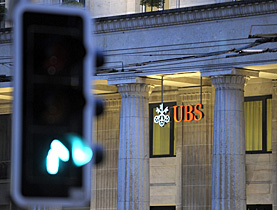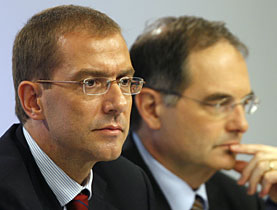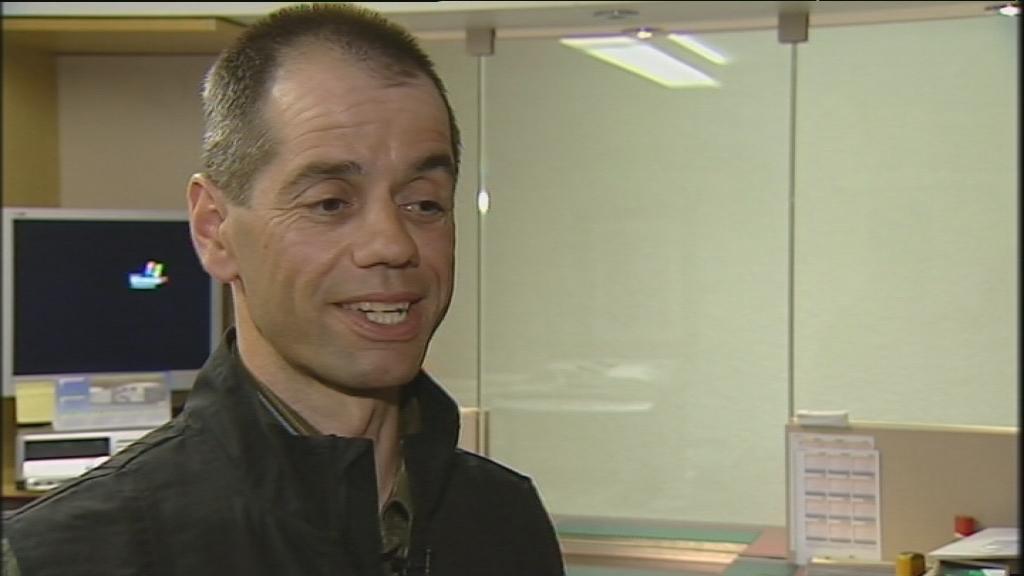“New” UBS unveils strategic rebranding

Battered bank UBS has attempted to slip free from an avalanche of negative figures and bad publicity by announcing details of its new path to anticipated recovery.
The strategy presentation arrived on the same day that the Swiss government revealed the criteria for handing over the names of 4,450 UBS clients suspected of tax evasion to the United States tax authorities.
The bank said it hopes to produce a pre-tax annual profit of SFr15 billion ($14.87 billion) in the next three to five years.
This follows losses of SFr20 billion in 2008 and in seven of the last eight quarters.
The main drivers of this anticipated turnaround would be increased trading activity in its investment banking arm and refocusing wealth management towards growing markets and the world’s wealthiest people.
“Our strategy represents an evolution in terms of our business portfolio but a revolution in terms of the way we will operate,” chief executive Oswald Grübel said in a statement before the meeting.
Building new bank
Grübel indicated that the time was now ripe for growth as most of the repair work had been successfully carried out. He also talked about a new “client-focused” culture at the bank that would cut out the wild excesses that cost UBS some $50 billion in write-downs following the subprime mortgage debacle.
“Essentially, we are building a new bank,” he told an audience of analysts and media in Zurich on Tuesday. “We want to make sure that what happened to UBS will not happen again.”
Senior executives took turns at the podium to outline how their divisions would now concentrate on growth. The bank will continue hiring in key positions, adopt more aggressive trading strategies within a new risk management culture and enhance margins through fees.
The One Bank business model, that encourages cooperation and the flow of client assets through divisions, was officially reinstated. UBS had disentangled its private banking, asset management and investment banking arms in August 2008 to avoid cross-contamination during the financial crisis.
Chief Financial Officer John Cryan said the failed One Bank model would be replaced by one that actually worked. “We paid lip service to integration, but we were not really integrated,” he said.
Hosing down
UBS has been haunted by massive client asset outflows after its reputation sank into the mud. Rich individuals, families, trusts and corporate clients pulled out SFr226 billion in 2008 and more than SFr90 billion so far this year.
The bank estimates that a quarter of its SFr435 billion of European wealth it manages could be at threat from a series of tax amnesties.
However, it remained upbeat that this could be clawed back through European onshore activities, particularly in Germany and Britain, in its stronghold of Asia as well as in emerging markets. UBS will particularly focus on capturing the assets of “ultra high net worth individuals” – those with a billion or more of spare cash.
Bob McCann, the new head of Wealth Management Americas, made his public debut by talking about a return to old-fashioned principles of client relationships rather than treating customers as part of a distribution network.
“I don’t know that any client likes to be on the receiving end of distribution. It must be a bit like being on the receiving end of a firehose,” he said.”Most big financial decisions get made around the kitchen table. Our client relationship managers need to work at getting a seat at that table.”
US tax details revealed
Just as the bank released its new strategy in Zurich, government officials in Bern were explaining the formula for handing UBS client details to the US tax authorities under the terms of a deal thrashed out in August.
This breach of Swiss banking confidentiality was enforced after UBS admitted some of its staff had actively helped US citizens to evade taxes. The details of how the 4,450 names would be chosen had been kept under wraps until the end of a US tax amnesty.
US clients who hid SFr1 million or more in undeclared assets at UBS between 2001 and 2008 would have their details handed over, as could those who had earned an average of at least SFr100,000 in dividends and interest from those accountsin the last three years.
The disclosure threshold would be lowered to SFr250,000 of assets if evidence of tax fraud could be provided. The first 500 names had already been selected, the Swiss authorities said.
Matthew Allen, swissinfo.ch
UBS is attempting to restore profits after becoming the worst European victim of the subprime crisis.
Its problems started to become apparent in July 2007, when chief executive Peter Wuffli stepped down following the collapse of the bank’s hedge fund Dillon Read Capital Management.
In October 2007, UBS said it would cut 1,500 jobs in its investment banking arm. Chairman Marcel Ospel stepped down in April 2008.
In October last year, the Swiss National Bank (SNB) was forced to inject SFr6 billion ($5.29 billion) into UBS. A facility was also set up to allow the bank to bin up to $60 billion of toxic assets.
UBS has also been haunted by a US investigation that accused the bank of helping wealthy Americans illegally evade $200 billion in taxes. It was forced to pay $780 million in fines and hand over the confidential details of 4,450 clients.
The bank posted a SFr20 billion loss for 2008 and has remained in negative territory ever since, announcing losses of SFr564 million in the third quarter of this year.
Perhaps more of a worry have been the massive outflows of assets from the bank’s wealth management and asset management businesses. These have totaled SFr226 billion in 2008 and more than SFr90 million so far this year.

In compliance with the JTI standards
More: SWI swissinfo.ch certified by the Journalism Trust Initiative





You can find an overview of ongoing debates with our journalists here . Please join us!
If you want to start a conversation about a topic raised in this article or want to report factual errors, email us at english@swissinfo.ch.